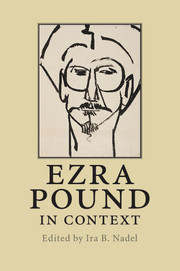Book contents
- Frontmatter
- Contents
- Notes on contributors
- Acknowledgements
- Chronology
- List of abbreviations and note on references to The Cantos
- Introduction
- Part I Biography and works
- 1 Prose criticism
- 2 Poetics
- 3 Translation
- 4 Romance languages
- 5 Letters
- 6 Editor, anthologist
- 7 Education
- 8 Journalism
- 9 Politics
- 10 Economics
- 11 Radio broadcasts
- 12 Law
- 13 Textual criticism
- 14 Archives
- 15 The Lives of Pound
- Part II Historical and cultural context
- Part III Critical reception
- Further reading
- Index
7 - Education
Published online by Cambridge University Press: 05 July 2014
- Frontmatter
- Contents
- Notes on contributors
- Acknowledgements
- Chronology
- List of abbreviations and note on references to The Cantos
- Introduction
- Part I Biography and works
- 1 Prose criticism
- 2 Poetics
- 3 Translation
- 4 Romance languages
- 5 Letters
- 6 Editor, anthologist
- 7 Education
- 8 Journalism
- 9 Politics
- 10 Economics
- 11 Radio broadcasts
- 12 Law
- 13 Textual criticism
- 14 Archives
- 15 The Lives of Pound
- Part II Historical and cultural context
- Part III Critical reception
- Further reading
- Index
Summary
And if your kids don’t study, that’s your fault. Tell ’em. Don’t kid yourself, and don’t lie.
(xcix/725)“Il nemico è l'ignoranza”: Ezra Pound's daughter Mary de Rachewiltz once identified this terse proposition as her father's “slogan” in the years prior to World War II. It can no less reasonably be understood as a lifelong maxim, an ideal instance of the “gists and piths” (ABCR, 92) that motivated and moved the poet, and did so long before he formulated that memorable phrase. Pound's unwobbling belief that “not knowing” is the real enemy gestures with appropriate force and emphasis to the twin functions of “to educate,” from a verb suggesting both “to bring up” (educare) and “to lead out” (educere). That is to say, it invests education with an urgency that applies equally to the family and the polity, one which may be extended without distortion to an ethical responsibility for all serious artists (aliter: “the damned and despised litterati”) (LE, 21). During the 1920s Pound concluded that “[t]he aim of state education has been (historically) to prevent people from discovering that the classics are worth reading” (SPR, 213). In response, as he became increasingly remote from the centers of culture and higher learning, his pedagogical rhetoric became increasingly concerned with the idea that “the mental life of a nation is no man's private property. The function of the teaching profession is to maintain the health of the national mind” (LE, 58).
- Type
- Chapter
- Information
- Ezra Pound in Context , pp. 75 - 84Publisher: Cambridge University PressPrint publication year: 2010
- 1
- Cited by

